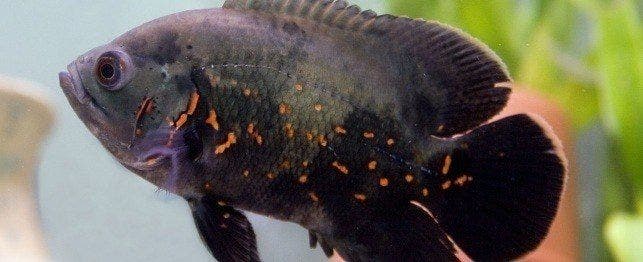
Choosing an Oscar
Among aquarists, the Oscar is a popular species of fish kept for their size, easy maintenance and personality (yes-personality.) The scientific name of the Oscar is Astronotus ocellatus and refers to the eyespot markings on the back of the body. There are many different types of Oscars that vary in size and coloration. The Oscar is an Amazon native and can easily grow from 12-16″ in a home aquarium and live up to 15 years.
Husbandry
Oscars are easy to raise and feed. It is usually best to start small with one to four one-inch babies. The biggest consideration for the number of fish to house is tank size and filtration system. These fish thrive in most fresh water aquarium conditions, but like slightly warmer (76-80F) and slightly acidic (pH 6.5-7.5) water best. They grow very rapidly, will eat whenever food is offered, and produce more than the average amount of fish waste. A good filtration system, regular water changes and a large enough tank will help accommodate their size as they grow. It is not unusual to see an Oscar outgrow a 30-gallon tank in a year. Provide them with the biggest tank your budget and space will accommodate. Large Oscars often need tanks of 100-gallons or more. Oscars generally favor a tank that includes rock or rock ledges to make them feel safe and encourage breeding if that is your goal. They can be destructive, so make sure any rock formations you construct are secure so they don’t fall and hurt your fish.
Feeding
In general, no one has problems getting an Oscar to eat. Their preference is live food, small fish earthworms, and brine shrimp for smaller babies. If you raise your fish from a small size, you should have no problems getting them to accept pelleted or flake food if you prefer. Larger adults raised on live fish do not always make the transition to prepared foods. Oscars also like small amount of beef heart as a treat. Provided they are not overfed, your Oscar should have a vigorous appetite and accept food readily. A sluggish fish not interested in food is most likely sick and needs to be evaluated for disease. Resist the temptation to feed your fish every time you visit the tank. They are beggars and always act as if they are hungry.
Overfeeding can cause too rapid a growth rate and lower water quality due to an overproduction of waste.
Tank Mates
If you think your Oscars need company, select carefully. Any fish small enough to fit in an Oscar’s mouth will most likely be eaten. Although Oscars are large, they are generally peaceful and more aggressive fish can attack them and nip at fins or body. A few species to try include algae eaters, Texas Cichlid, Firemouths, Jack Dempseys and Convicts. Monitor any new tankmates carefully for signs that they are harassing or being harassed. Be prepared to move any fish not compatible to another tank.